#the other characters represent war and death and an inability to move forwards to me
Photo
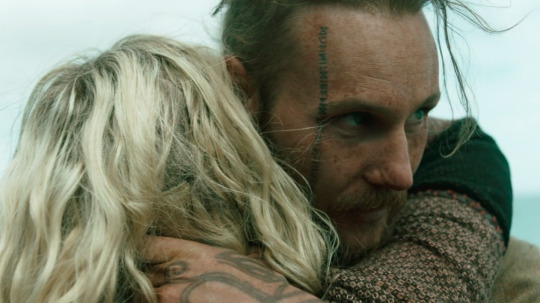
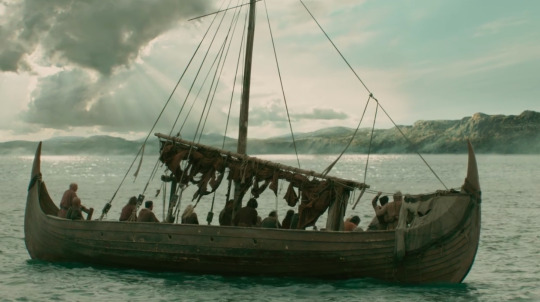
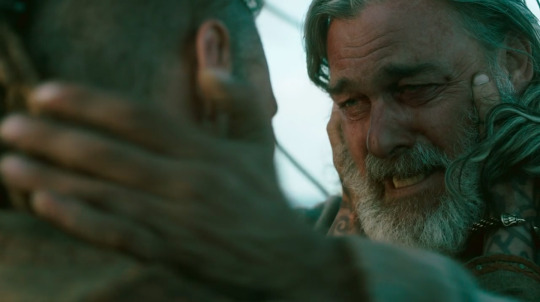
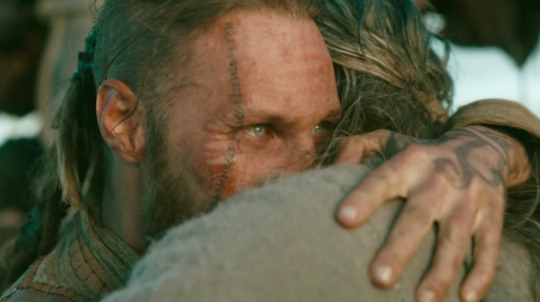
"𝙔𝙤𝙪 𝙬𝙚𝙧𝙚 𝙧𝙞𝙜𝙝𝙩. 𝙀𝙫𝙚𝙧𝙮𝙩𝙝𝙞𝙣𝙜 𝙩𝙝𝙖𝙩 𝙮𝙤𝙪 𝙨𝙖𝙞𝙙 𝙬𝙖𝙨 𝙩𝙧𝙪𝙚! 𝘼𝙣𝙙 𝙄 𝙨𝙝𝙤𝙪𝙡𝙙 𝙝𝙖𝙫𝙚 𝙗𝙚𝙡𝙞𝙚𝙫𝙚𝙙 𝙮𝙤𝙪. 𝙀𝙫𝙚𝙧𝙮𝙗𝙤𝙙𝙮 𝙨𝙝𝙤𝙪𝙡𝙙 𝙝𝙖𝙫𝙚 𝙗𝙚𝙡𝙞𝙚𝙫𝙚𝙙 𝙮𝙤𝙪! 𝙁𝙤𝙧𝙜𝙞𝙫𝙚 𝙢𝙚! ����𝙡𝙚𝙖𝙨𝙚 𝙛𝙤𝙧𝙜𝙞𝙫𝙚 𝙢𝙚..."
"𝙔𝙤𝙪 𝙙𝙤𝙣'𝙩 𝙣𝙚𝙚𝙙 𝙛𝙤𝙧𝙜𝙞𝙫𝙚𝙣𝙚𝙨𝙨, 𝙐𝙗𝙗𝙚, 𝙨𝙤𝙣 𝙤𝙛 𝙍𝙖𝙜𝙣𝙖𝙧. 𝘽𝙚𝙘𝙖𝙪𝙨𝙚 𝙄 𝙠𝙣𝙤𝙬, 𝙙𝙚𝙚𝙥 𝙞𝙣𝙨𝙞𝙙𝙚, 𝙮𝙤𝙪 𝘼𝙇𝙒𝘼𝙔𝙎 𝙗𝙚𝙡𝙞𝙚𝙫𝙚𝙙. 𝘼𝙣𝙙 𝙩𝙝𝙖𝙩 𝙞𝙨 𝙬𝙝𝙮 𝙬𝙚 𝙖𝙧𝙚 𝙝𝙚𝙧𝙚. 𝙏𝙝𝙖𝙩 𝙞𝙨 𝙬𝙝𝙮 𝙬𝙚 𝙖𝙧𝙚 𝙃𝙀𝙍𝙀!"
Vikings Season 6 Episode 17: The Raft of Medusa
#when i tell you this scene had me SOBBING MY EYES OUT#PLZ UNDERSTAND I AM NOT EXAGGERATING WHATSOEVER#i love ubbe so SO much#and honestly if jordan patrick smith doesn't get some form of award for this season there is no justice in this world#bc he managed to keep me very emotionally tied to a storyline#WHICH DID NOT LEAVE A BOAT FOR THREE EPISODES STRAIGHT#and frankly outshone the ENTIRETY of the other drama in e17 in this five minute scene#the other characters represent war and death and an inability to move forwards to me#ubbe represents growth and a new life and i am so proud of him for it#ubbe lothbrok#ubbe ragnarsson#othere#ubbe x torvi#vikings#vikings s6#vikings spoilers#history vikings#sarah rambles#LOVE OF MY LIFE
68 notes
·
View notes
Note
Do you think something similar, as in taking on the identity, is here regarding the name 'Babel'? (that sort of name has... unfortunate implications in terms of "agenda of this organization must be a form of great arrogance because Tower of Babel was destroyed because it tried to reach the Heavens and God and in the process to prevent it, the tongues were mixed up" and in "Tower of Babel is something always destenied to fall from the beginning"
There’s definitely a connection in the sense of Babel being meant to fail from the onset; I’m not exactly clear on the specifics but it seems to me as if the upcoming failure and death of it’s leaders was well known by at least the Doctor and Theresa, and this is why so many Sarkaz characters like Shining, W, and Flamebringer have mixed feelings about the Old Doctor. There’s a very strong possibility that he orchestrated or was complicit in the loss of that conflict on the short term in order to further later goals, destroying the lives and hope of much of the Kazdel Sarkaz in the process.
How that represents arrogance and defiance of god I am less specifically clear on, as we don’t even truly understand what Babel’s and the Doctor’s true motives at the time were beyond the resolution of the Kazdel Civil war, a war which as mentioned above they were both fated and prepared to lose. Further connections to the monstrous skeleton they were transporting, the truth of Originium, the Doctor’s identity, and the ancient sarcophagus etc are all far off clues we have to consider broadly to piece something together.
However, the collapse of Babel and the loss of the war also directly lead to the scattering of the Sarkaz people as their national identity under their true king was thrown into disarray, and their personal identity as free roaming nomads and mercenaries was destroyed by the Usurper Regent’s drafting them into a central army. A shattering and corrupting of their unifying language.
So where do the formation of Rhodes Island, the Doctor’s plans, Theresa’s Legacy, and Amiya’s Inheritance fall among that? Well, we are clearly the scions of that conflict, dealing with the fallout of a worldwide societal collapse in communication and understanding. The inability of people, to empathize and connect with each other is a great deal of what Rhodes Island is seeking to correct and fight against, whether from different nations or creeds or organizations, Infected and uninfected, Reunion and Rhodes, this is one of the great struggle that Terra finds itself in, tearing itself apart as nations and cities isolate themselves, focusing populations on Arks and cities to escape Catastrophes.
As a successor to Babel, Rhodes Island are not only taking on Babel’s remaining strengths, but also their greatest failures as we are now forced to deal with the fallout of the original Doctor and company’s decisions, sins and virtue of that time alike while we try to move forward with Amiya’s dream.
18 notes
·
View notes
Text
Mao Dao Zu Shi’s Monster
Call it war, call it threat
You can bet they all will follow
For in times like this, they'll do just as I say
We don’t like what we don’t understand; in fact it scares us...
“Mob Song,” Beauty and the Beast
I finally finished watching Mao Dao Zu Shi, and I read as much as is translated right now and know the gist of what happens but someone please lend me those last three chapters sob sob sob. This meta will have spoilers from the novel, apologies. I thought about making two versions but that seemed a bit too much, and the entire story is so perfectly structured thematically that I just had to talk about all of it. As a warning, this meta will discuss the canon-depicted homophobia a bit. And sorry but I ramble a bit here :(
In my review of the anime, I said this:
For a series that starts off with our heroes fighting ghouls and quickly includes battles with zombies, tortoise dinosaurs, etc., it soon becomes apparent that the real monsters the characters are fighting aren’t the dead nor are they the unknown like the tortoise. They’re the characters themselves. Mao Dao Zu Shi offers a pretty resounding rebuke of society and its tendency to drive people to monstrous deeds, and does this in a number of fascinating ways. The characters’ flaws are almost always two-sided coins in that their flaws are also their strengths, but with the right (or really, wrong) circumstances, they can destroy the best parts of them and turn them into monsters.
And hooray, these ideas continue to be explored in the novel, and as the story approaches its climax, it becomes pretty blunt as well. Jin Ling’s arc kind of encapsulates all of these ideas, as in the end he’s left realizing he cannot hate any of the people he spent years blaming for his parents’ deaths, and realizes that that doesn’t mean it’s his fault. The series doesn’t point to him and say “look how wrong you were!” but rather “it’s hard, isn’t it?” Because Jin Ling’s hatred was not created in a vacuum; instead, it stems from the messages society gives him: its tendency to label people as villains, its messages of toxic masculinity and homophobia, all of which are constrained in an overall lack of empathy.
Jin Ling’s realization includes the overall basic themes that shit happens in life that you don’t deserve, because the world is messed up, and people who do things that hurt you have also had things done to them that they didn’t deserve, and had no choice in. It picks apart the circumstances--be they birth, parents, culture, pressure, trauma--that go into driving people to make the choices that they make, whether they justify these choices to themselves or whether they don’t even try. And by doing so, as a story, Mao Dao Zu Shi encourages empathy as a way to move forward, to redeem yourself, to forgive or to at the very least take a step. I mean, empathy is literally the name of a technique that saves them all in Yi City.

Wei WuXian, our villainous main character in need of redemption, has his tragic fall depicted in the first season of the anime. As a child Wei WuXian grew up on the streets, and even after being taken in by Jiang FengMian and his family (thanks to Jiang FengMian being, it is implied, in love with Wei WuXian’s mother), he simply doesn’t fit into society after having been left to tumble through the streets like trash for a year. He’s constantly thinking outside the box, and he channels his pain into extreme cheeriness, but it’s all a mask. He doesn’t behave, doesn’t listen to rules, speaks out when he should keep his mouth shut. Sometimes this is good, because the rules are arbitrary; sometimes, it’s really bad, because the rules are designed to protect.

This nuanced dichotomy is explored really well in his relationship with Lan WangJi, in that the 3000 rules of the Cloud Recesses are pretty restrictive, and Lan WangJi needed to break out of his legalistic life. However, when he turns to the dark arts and takes revenge on Wen Chao (the Wens represent the privileged in society--at first, that is), Lan WangJi is horrified by the very traits of freedom and not caring about society’s rules that helped him fall in love with him, because he can see that Wei WuXian is walking a very dangerous path (and a cruel one in that particular moment as well). His invitation to come back to the Cloud Recesses with him was meant to help Wei WuXian, but why would he trust society in that moment?
Society told the Wens it was fine to destroy his entire clan and family, hurt his brother, and so he went outside of it to find revenge and to stop the Wens. He’s told that because he broke the rules and insulted the Wens, he brought about the destruction of his family (hence, it’s his problem to fix). He’d only come to expect punishment and condemnation from the Lan clan, and Lan WangJi’s inability to be honest about his feelings no doubt led to his mistrust, as he bluntly tells Lan WangJi he won’t let him punish him anymore.
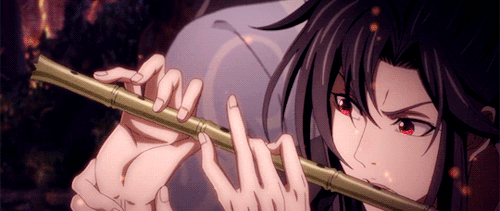
Lan Wangji, in contrast to Wei WuXian, Wen Chao, and Jiang Cheng, has to repress himself. His sect encourages stoicism and while that leads him to good choices in some ways, his inability to express his feelings to Wei WuXian before it’s too late leads to disaster. Wei WuXian truly didn’t believe he cared at all for him, because Lan WangJi had to keep it to himself. But when Wei WuXian returns, he goes against society for his sake. As Wei WuXian notes:
But what he hadn’t expected was that when everyone feared him and flattered him, Lan WangJi scolded him right in his face; when everyone spurned him and loathed him, Lan WangJi stood by his side.
The beautiful thing about their love in addition to all the ways they care about each other and encourage each other to grow is that it also works perfectly thematically: it contradicts societal expectations by being between two men, and no matter their status in society, it encourages/challenges WangJi to stand against it, instead of going along with his society like he has in every other aspect of his life. His brother, after all, tells Wei WuXian that WangJi’s “only mistake was you.”

Society then fears and flatters Wei WuXian, until he loses control, and then they despise him, because society always needs a villain. What they hate isn’t so much what Wei WuXian did, but the idea of him. They hate him and attribute things he never did to his name (though he did quite a lot), simply because society is like that, without stopping to consider the nuance or hypocrisy of what they need.

And Lan WangJi is continually challenged to go against society for the person he loves. The scenes at the Demon Cave exemplify this, where a mob of people show up demanding Wei WuXian’s blood even though he just saved all of their children, and Lan WangJi refuses to back down, and in the end Wei WuXian winds up saving all of their lives. But society doesn’t think, doesn’t empathize, doesn’t consider what the prices actually are. They go along with a crowd to feel like they belong, a mob mentality, really (which is a psychological phenomenon):
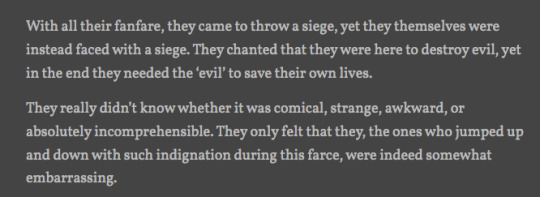
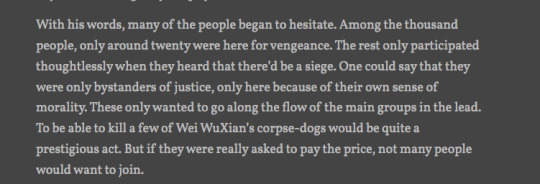
Society’s desire for a villain and lack of critical thinking is exemplified in the Wens. The Wens are respected among the sects at first, feared even. Wen Chao in particular exemplifies toxic masculinity as well. He abuses his powers, sexually with harassing MianMian, and in other ways as well, in that he uses the lives of other sects’ cultivators as shields, as he’s called out for, when they go into the turtle’s cave. The cave is rather a metaphor for the entire story: the Wens drag everyone into the cave under the illusion of using them as victims/shields to protect their power, but the Wens lose their power when JiaoJiao (a poor mistress, showing how society is arbitrary and can’t stick to its own rules because people are more than robots) demands they sacrifice MianMian (MianMian)) to lure out an ancient monster (lies in society). Lan WangJi stands up to them to protect her, Wei WuXian saves her from being scarred, and then it’s Lan WangJi and Wei WuXian who work together to kill the monster (their love as the thematic core of dismantling society).

But after Wen Chao’s story doesn’t end there. After he exacts his revenge on Wei WuXian, Wei WuXian destroys him in a cruel way leading to society thinking it’s okay to punish all Wens. Lan Wangji expresses discomfort with the way in which Wen Chao is tortured, but Jiang Cheng insists he deserves it. However, when all Wens are pretty much considered pariahs, Wei WuXian, who has not let go of all his empathy despite the dark path he’s walking, stands up to Jiang Cheng for their sake. He understands that people like Wen Ning and Wen Qing are not bound by their blood, and that they are good people. But society doesn’t care. Their names are enough.

The thing about Jiang Cheng is that as much as he professes to despise Wei WuXian... he’s not any different. He claims to be unable to forgive Wei WuXian for the deaths of his parents (not Wei WuXian’s fault) and the death of their sister (okay that one’s his fault), but doesn’t really pay attention to the feelings of those around him, resulting in him becoming more or less a tool for society. His sister sacrificed herself, pushing Wei WuXian out of the way, for the very person he hates, and despite the supposed nature of his grudge, he isn’t very nice to her only child, his nephew Jin Ling. The boy actually runs away from him several times--essentially, Jiang Cheng acts similarly to the father whose issues are at the root of Jiang Cheng’s issues: like he just doesn’t like him, when really, Jiang Cheng loves Jin Ling and he loves Wei WuXian.
Because what’s at the root of Jiang Cheng’s issues is that he has a massive inferiority complex. He embodies toxic masculinity, believing he has to do everything himself, refusing to accept help, refusing to accept responsibility because he doesn’t want to be weak, all because he wants to prove himself to a long-dead father. He wants to prove himself to society, and so goes to extreme lengths to exterminate any trace of Wei WuXian, capturing and torturing the ones he believes might house Wei WuXian’s soul. It’s all about appearances of strength and righteousness for Jiang Cheng, and the focus on this transforms him into someone uncomfortably similar to Wen Chao in some ways, someone who uses the power given to him as the heir of his sect to hurt others rather than to protect, even if it’s in the name of protecting.
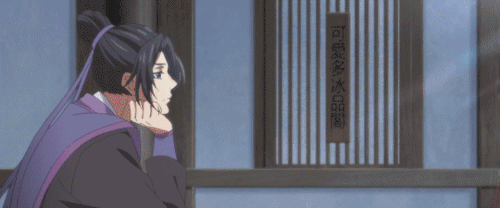
The whole reason Jiang Cheng has this inferiority complex comes down to the societal aspects of toxic masculinity, sexism, and the like as well. There’s a contrast between the grace and respect society and the initial framing of the story offers Jiang FengMian, in contrast to his wife. He’s not a good father or husband, unable to pretend he didn’t love Wei WuXian’s mother instead, and while he’s kind to Wei WuXian, he doesn’t show his son the same affection. And his neglect breeds resentment both in Yi ZiYuan, his wife, and in Jiang Cheng, which spills over onto Wei WuXian. Yi ZiYuan’s lot in life is pretty sad, though she has no right to take it out on Wei WuXian (which she does), but as the story develops, we start to see that this idea is wrong, and the story builds empathy for Yi ZiYuan to the point where she easily became a favorite character of mine.

Yi ZiYuan’s cruelty was a result of jealousy and inexcusable, but when push comes to shove, she does love Wei WuXuan, and tries to save his life the only way society allows her to: by being cruel. When JiaoJiao demands punishment for the cave incident, Yi ZiYuan whips Wei WuXian to the point where Jiang Cheng is screaming in horror, but we soon realizes she only did it to get JiaoJiao to back off. But society doesn’t back down: JiaoJiao isn’t satisfied, and JiaoJiao demands Wei WuXian’s right hand. Yi ZiYuan refuses, sacrificing her life and the lives of her entire clan for Jiang Cheng, Jiang YanLi, and Wei WuXian.
The entire structure of the story is about undoing a tragedy, a tragedy the world basically brought on them, but you can’t erase what happened so much as you can do your best to set things right. This stems from MZDS’s basic premise that society creates monsters and tragedies, but you do not have to be one yourself if you empathize. And part of the ways in which the characters step outside of the tragic set up is through going against society: Wei Wuxian and Lan Wangji acknowledge their love, Wen Ning tells Jiang Cheng the truth about his golden core, etc.
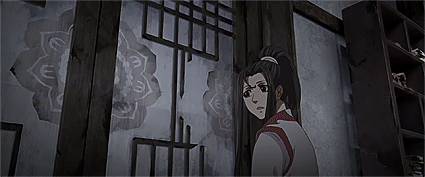
It’s fitting that the story begins with Mo XuanYu’s suicide. He is a bastard child, scorned by society for being gay and for hitting on a respected cultivator. However, as we find out, the respected cultivator was actually no more respectable--Jin GuangYao was Mo XuanYu’s own brother, and had incestuously married his own sister after getting her pregnant before the wedding, then murdered their son. Society spat on Mo XuanYu for his crimes, offering a poor bastard, the son of a whore and a respected man with nowhere to go, drove him to suicide, and it worshipped his brother without realizing the extent of his crimes. It’s arbitrary and not interested in truth, but in scapegoats. But in expressing his pain through a way that ends his life, his story is told, and the truth comes out, and some members of society get a little less homophobic.
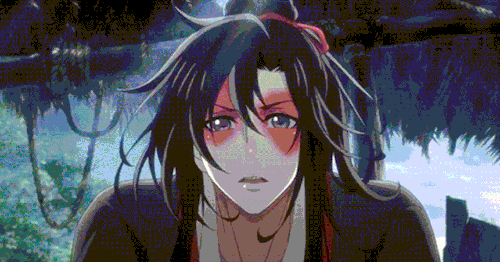
It’s also fitting that it ends with the courage of a prostitute whose face has been horrifically scarred. Sisi’s story sparks the motion that will tumble down all the lies in the sect, and even clear Wei WuXian’s name.

The final battle occurs in a temple, a temple built over the ashes of a brothel where Jin GuangYao grew up. The message isn’t subtle: society created him as an outcast, and him fitting in was simply fake and he knew it, but he felt like he had no options. And it took another outcast, someone with no power at all, to help topple him. And even when he dies, the reader can’t help but see how he became what he was, and it’s difficult to hate him.

The kids--Jin Ling, despite his professed homophobia at the beginning, Lin Sizhui, and Lin Jingyi, and the other more minor characters--are much more supportive of Lan WangJi and Wei WuXian’s relationship, noted to express excited shock over Lan WangJi giving Wei WuXian his hair ribbon (as a symbol of love), give them their privacy on the boat, etc. Jin Ling, too, moves from professed discuss over Mo XuanYu’s affection for men along with his hatred of Wen Ning and Wei WuXian, to respect and admiration for Wei WuXian, care for Wen Ning after Wen Ning saves his life, and respect and even support of Lan WangJi and Wei WuXian’s relationship. (You could say an anti became a shipper :P) Jin Ling’s growing understanding of empathy enables him to open up to his peers, and to open up his mind to a progressing world.

At the beginning, his inability to fit in leads to his own misery; as he develops, he begins to form true connections, not cheap societal connections, and begins to develop. This combined with a revelation that Jiang Cheng does care more than he lets on and Lan WangJi and Wei WuXian professing their love in a temple while being held hostage with his older brother watching via shouting the line “I really wanted to sleep with you!” which is the most socially inappropriate and awesome love confession ever and then running off to get married. And Jin Ling shows us his development by crying, something repeatedly noted as shameful for an adult man (which tends to be the case IRL too), and crying freely even though he’s scolded for it, because it’s the only way he can express what he feels and he’s going to express it.
Snapshotted translations taken from Exiled Rebels Scans; further translations from @chiaki_homura on instagram!
#mao dao zu shi#wangxian#lan wangji#wei wuxian#jiang cheng#wen chao#yi ziyuan#jiang fengmian#jin ling#wen ning#wen qing#mdzs spoilers#mdzs meta
124 notes
·
View notes
Text
Tony Stark and the Myth of Icarus

“Sometimes you gotta run before you can walk,” Tony Stark says before taking his newly designed suit out into the world. It’s the second time he’s harnessed the power of flight. The first time Tony flies is immediately after escaping capture in an Afghanistan cave.
It’s upon his second lift off that Tony’s able to truly revel in his work. He flies higher, higher, higher still, until his system shorts out and the ice builds on the unpainted metal. Though it’s not the same as fire to feathers, Tony topples towards the Earth in the dead weight of his iron man suit anyway.
Just before he hits the ground, his wit saves him. Tony unpacks the ice, the system restarts, and he bolts back into the air to later, somewhat safely, crash into the garage of his sleek Malibu home. He does not burn. He lives and goes on to create more suits, save more lives, and attempt to shed the skin of his reputation as “The Merchant of Death.”
While most remember the fall of Icarus acutely—the myth is named for him, after all—it’s important to remember that Icarus’ fall came at the hand of his father’s mistakes. The truth is without Deadalus’ hubris, Icarus would never have fallen in the first place, as Icarus wore wings to escape the tower where he was arrested with his father by the fault of his father’s sins.
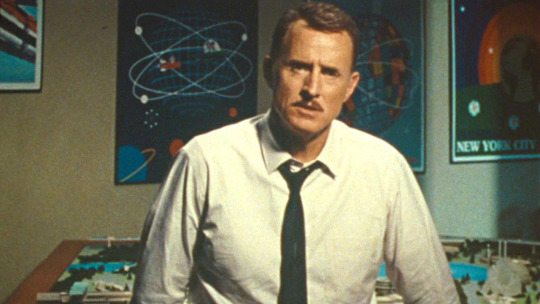
Deadalus, Icarus’s father, was an impeccable engineer imprisoned for creating a monster. Icarus was imprisoned with him. Like Icarus, Tony is accountable for the nepotistic cruelty of his father’s legacy. Tony is held by others and himself to the complacency of staying within a system that he does not check. He flies high in the money, the lifestyle, and the women until brought down by the attack in Afghanistan. It takes a literal shot to the heart before Tony begins truly addressing the privileged state of existence he has lived in.
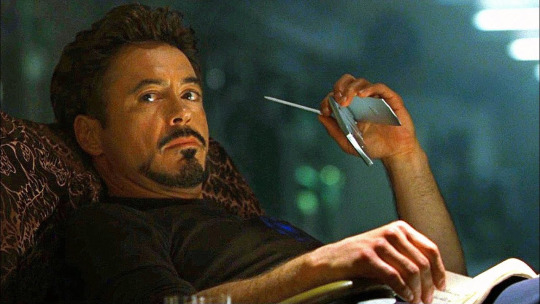
To understand the constant reaching of Tony Stark, it’s important to remember the man who raised him. Howard Stark is described by Tony as, “cold, calculating,” and that Howard “never told [Tony] he loved [him], he never even told [Tony] that he liked [him].” Howard’s character is established in a handful of ways: flashbacks, mentions, and the rare instances of time congruent depictions in Steve Roger’s story, for the short time that the two interlocked their timelines.

We meet Howard through the eyes of Steve, pre-serum, first, as a man creating flying cars and helping in engineering the super soldier serum application. Howard would later go on to obsess over the serum, creating the catalyst of movement in Civil War when he meddles with enhancement—trying to recreate Steve’s physical prowess through means of obsession. It ultimately leads to his death, as Howard is killed by The Winter Soldier in the middle of transporting the serums.
Howard Stark, within the canon of the MCU, helped create the atomic bomb. He also meddled in the creation of magical weapons of mass destruction (as seen in Agent Carter). Howard builds the Stark name on the back of war. Other notable accomplishments of Howard include the study of the Tesseract, which Tony later uses to create a new element to sustain his arc reactor, but we’ll get back to that later.
Spoken amid Tony’s risk-taking behaviors revolving around an end of life crisis, a post-humous video of Howard is delivered to Tony while Tony struggles to save his own life. “I built [The Stark Expo] for you. And someday, you'll realize that it represents a whole lot more than people's inventions. It represents my life's work. This is the key to the future. I'm limited by the technology of my time, but one day you'll figure this out. And when you do, you will change the world. What is, and will always be, my greatest creation…is you.”
A short unpacking can illuminate that Howard refers to his son as on level with his other engineering exploits, that he is a creation solely attributes to Howard’s existence and intellect that was made to further establish Howard’s life work and influence on the future. It doesn’t matter that perhaps Tony might not grow up to pursue the same goals as his father. As a connection to Howard, Tony must live up to what Howard has done. That means the good, and also the bad.
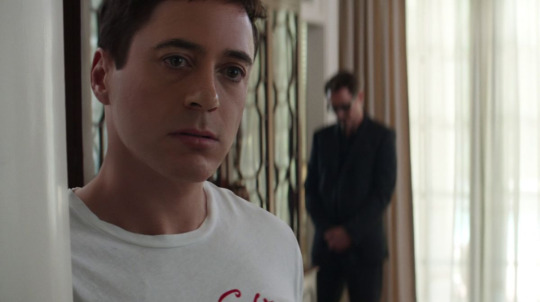
Later in the MCU timeline in Captain America: Civil War, Tony creates a virtual reality interface that so aggressively hijacks his hippocampus that he is later seen recovering from what he calls “Electromagnetic headaches”. Howard, in a reality that Tony recreated from memory, tells his son, “They say sarcasm is a metric for potential. If that’s true, you’ll be a great man someday.” Someday being the thing to key in on here, the furthering of a narrative that Tony has based his life upon; that he needs to live up to another man’s metric.
It’s important to note that both of these quotes occur during moments of extreme agitation for Tony. More notable in every adaptation than his performative arrogance is Tony’s lethal guilt complex. The BARF recreation of his memories allows Tony to relive memories and process his trauma… In front of an auditorium filled with people. He then funds the entire school body in their intellectual pursuits. He notes, “It helps ease my conscience.” Tony edges ever further low in his humility, closer to metaphorical drowning.
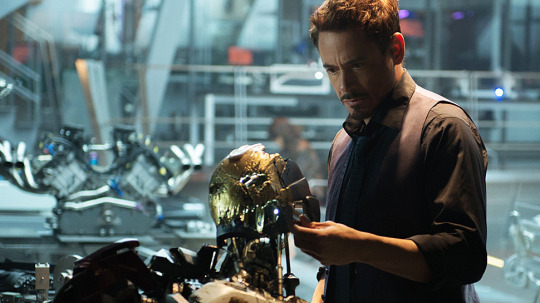
Tony’s arc in Age of Ultron centers around the idea of making himself obsolete. “Isn’t that the ‘why’ we fight, so we can end the fight?” he asks. He’s constantly fighting against societal and self-imposed limitations. “I don’t want to hear the ‘man is not meant to meddle’ medley,” he snaps. Like Deadalus’ warning, Tony constantly wavers between two extremes—falling into the ocean of not doing enough (leading to the death of his fellow avengers) or burning by his hubris (creating Ultron, signing the accords, and there undoubtedly more examples).
The myth of Icarus constantly focuses on the danger of flying too high, forgetting that the outcome of both flying high and flying low is that ultimate moment of drowning in the ocean. Tony’s high flying, his ability to continue to create and move forward as the Avenger’s futurist, brings him further into the minds’ eye of global (and soon universal) society. Tony takes more and more and more accountability for the grand reach of himself and the behavior of the Avengers. Creating Ultron to keep the world safe resulted in the destruction of Sokovia, and so Tony is forced to correct course from flying too high to crashing too low which leads to the creation of Vision, but also in the signing of the accords.
The accords are an interesting aspect of Tony’s character journey, considering at no time does Tony ever display much confidence in their efficiency/usefulness. Natasha sums it up best by describing the motion as keeping a hand on the wheel, to steer them to the least troublesome outcome available. Tony later echoes this sentiment by discussing addendums and manipulating the accords to keep their heroism freedom in tact (by placing Bucky within a psych floor instead of a prison).
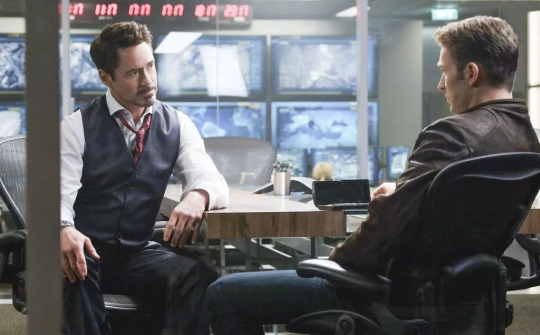
Ironically, Tony’s lack of confidence in the structure and balances within the Avengers facilitates to the destruction of the Avengers just as much as Steve’s unwillingness to sign them. Tony’s guilt (a bastardization of humility) ostracizes and isolates the Avengers from one another. In Age of Ultron, Wanda tells Steve, “Ultron can’t tell the difference between saving the world and destroying it. Where do you think he gets that?” The next scene takes us immediately back to Tony.
Unlike Icarus, Tony begins to take form of his own Deadalus and creates his own legacy with the Iron Man suit. However, the Iron Man suit becomes again associated with Howard’s memory when Tony is forced to use the technology of his father. When poisoned by his first draft of the arc reactor, the one powered by palladium, Tony is forced back to his father’s notes by the suggestion of Nick Fury (who, again, relates to Tony the importance of Howard). The new element replicates the renewable energy of the tesseract, which Howard studied but could not replicate in his own life. Despite the fact Tony is able to replicate an element he did not personally study in less than a week; the action is overshadowed by Howard’s constant call back to the element being his “life’s work”. Tony notes that Howard is still able to “take him to school”.

Howard is mentioned at least once in every film that involves Tony, but our clearest vision into their family dialogue rests in the interactions between Tony and Peter Parker in Spider-Man: Homecoming. Tony constantly makes references to “breaking the cycle” and makes active attempts to assist Peter. At the same time, Tony’s actions and his guilt do lead to instances of isolation between the two. It doesn’t take a parenting genius to understand that ignoring a child, even a teenager, and pushing them away is not an apt replacement for open communication. “I just wanted to be like you,” Peter says. Tony counters, “and I wanted you to be better.” A reference to young men being ‘metrics for potential’ is worth making, along with the importance of Peter’s self-establishment of what being Spider-Man means, but that’s another essay for another time.
Now, all of this isn’t to say Tony is somehow at fault for every aspect of every antagonistic plot movement within the MCU, but Steve’s (now ironic in hindsight) statement in Age of Ultron— “Sometimes my teammates don’t tell me things.”—does illustrate how Tony tends to push conflict forward. Tony’s guilt and constant struggle with communicating with others leads him to remove systems in place that might check and balance his attempts to better himself. Think of the rest of the Avengers like a committee of supportive players and Tony’s actions of only including some, or none, of them in his grand plans (something that stems from Tony’s inability to believe that the others may support him and his tendency for introverted work practices) only furthers the intensity of his mistakes for the team.
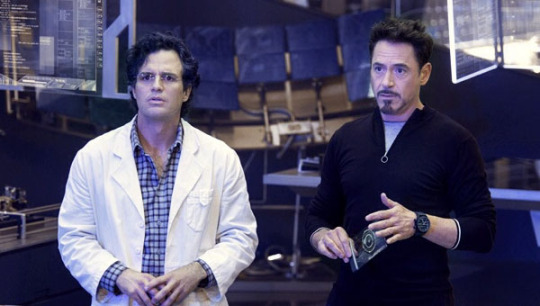
Tony goes to Bruce in creating Ultron because he knows Bruce’s curiosity is stronger than his loyalty to the other Avengers. (Bruce’s lack of interest in limitations versus scientific progress is evident by his very self-experimentation with gamma radiation and is not worth arguing about further.) Add the fact that Tony’s PTSD was irritated by Wanda’s vision; a vision that, when induced for the other Avengers debilitates them to a point that they have to retreat to a safe house; and it’s no wonder that Tony constantly waivers in his ability to differentiate between hubris and humility.
In a quick summation, Tony Stark mirrors the constant struggle between hubris and humility as told in the tale of Icarus. Tony’s journey as a superhero constantly ricochets between the two extremes lends vulnerability to vices like alcoholism, and isolation. He struggles as one of the main progressive forces of the marvel universe, and also as one of its largest handicaps.
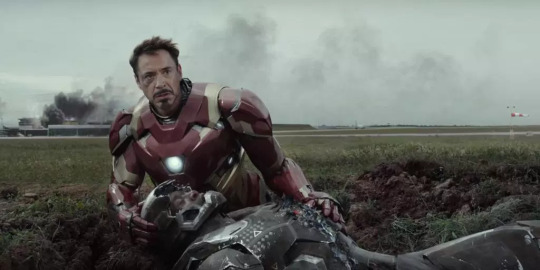
“The difference between ‘Iron Man’ and some other movies is that there’s no spider bite; there’s no magic bullet where a hero is born. We had to build him. We wanted people to remember that there’s a person inside that suit, and it will hurt if he falls.”
178 notes
·
View notes
Text
Albus Severus Potter: a defense of a well chosen name
(In conjunction with a truly excellent post by @waterbird13, I wanted to share my additional thoughts...but without word-vomitting all over their post.)
The name “Albus Severus Potter” is about healing. About moving forward. About Harry reconciling with his past, even the nasty parts of it, and choosing not to hold on to his old grudges for the rest of his life. To live.
The same thing he chose when he walked away from King’s Cross Station.
Over the course of these seven books, Harry watched Sirius, Snape, and Dumbledore all bow, bend, and even break under the weight of their old sins and hatreds. He saw how much their refusal to let go of, to live with and move on from, the past damaged them. One could even argue that it killed them:
If Sirius and Snape had been able to learn to trust each other (not to like each other, not even to forgive each other, but just to move on and stop treating one another like the vile kids they had once been) would the whole Department of Mysteries debacle have happened as it did? If the two of them had been able to come to an understanding of one another as allies, would Harry have trusted Snape enough to believe he would pass along his message about “Padfoot” and “the place where it’s hidden”? If he’d even just trusted Snape enough to come back to the castle and check with him after they left Umbridge in the forest, he would have known that Sirius wasn’t actually in any danger...but Harry didn’t think he could rely on Snape, because of the vicious cycle of loathing between Snape and Sirius (and the memory of his dead father). Certainly their mutual hatred did nothing to make life easier for the two of them, nor for the Order as a whole, weighed-down by their old grudges; whether Sirius might have survived past the end of OotP if he and Snape had come to some kind of understand is, of course, something we’ll never know. But don’t tell me it’s not a question Harry asked himself; he even brought up the issue with Dumbledore in the immediate aftermath of Sirius’s death.
Dumbledore knew that ring was a Horcrux and he put it on anyway. He isn’t stupid, he had to have known that was a bad move -- but he was overcome by guilt and grief and he did it anyway, because he wasn’t thinking logically, he was too consumed with the need to see his sister again and, presumably, get some kind of closure that he had spent so many decades longing for. And yes, Snape cast the final spell that ended his life on the Astronomy Tower, sure -- but he was already dying, that was the whole point. If he hadn’t been doomed, would he and Snape have come up with some other plan to deal with Draco? I expect Dumbledore would have wanted to stick around longer, if for no other reason than to increase their odds of winning the war, if not for the ring that doomed him due to his fixation on the Resurrection Stone. There’s a reason why Harry was able to drop the stone in the forest and leave it behind, even though he had lost so many people he loved himself; part of that reason is that he thought he was marching to his own death, true, but the other part is that even then, he was thinking about the future. Harry didn’t die to absolve the sins of the past; he died so his friends would have a future.
That Snape was consumed and, ultimately, destroyed by the ghosts of his path should require no further illumination on my part, but if you’re not clear on it just go re-read Prince’s Tale for starters or really any of the seven books because Snape’s whole character arc was one long line of misery and an inability to forgive, move on, or let go. Always, remember?
In DH we see Harry actively reject following Dumbledore’s path when he chooses to let the D.A. help him find the Horcrux. If Dumbledore had been able to let go of the pain of his past, maybe reconcile with Aberforth, would he have needed to keep all his secrets so close to his vest? Again, maybe Dumbledore would have gone down the same path in the end...but it certainly didn’t make him happy, clinging to the sins of the past like that, and Harry knew that by the end, and he chose to step away from that.
And back to Sirius for a tangent: if he and Regulus had not been so estranged, don’t you think it likely that Regulus would have sought-out his brother (whom he knew was working against Voldemort, he had to have known, Sirius had made no secret of his allegiances for years) when he decided to turn traitor, and maybe at least shared some information with him? Maybe asked for help, even -- but at the least, he might have sent Kreacher with instructions to seek Sirius out if he couldn’t destroy the locket on his own; how different would things have been if Dumbledore had gotten his hands on one of Voldemort’s Horcruxes back then? Maybe Regulus would still have died, maybe he would have still insisted on going into that cave alone save for his elf...but other lives might have been saved, if the Black brothers had been on speaking terms...
So in summation, we know that Harry saw, first hand, the kind of damage that clinging to the wounds of the past can do to people.
Now mind you, I’m not saying that some of these grievances were not legitimate things to be upset by. Because they were! And I’m not suggesting that anyone should be “required” to forgive people who’ve hurt them, because nope. Fuck that abusive nonsense. Goodness knows I am a spiteful bitch, and I’m not about to go spouting some “forgiveness is good for the soul” bullshit here! There are things that do not deserve to be forgiven, and anger is at least as powerful a motivator as any other emotion, and there is nothing unhealthy about anger in and of itself; anger can change the world.
However...there is a point where it gets in the way if you can’t learn to work with your anger, if you can’t learn to move on in spite of your grudges. Frankly I like to think that if I were in some kind of Order of the Phoenix situation, and one of my childhood enemies were part of the group too, I would be mature enough to be able to work with the slimy good-for-nothing bastard in a professional, civil manner; not forgiving, not forgetting, but also not focusing on my own wounded pettiness the way Sirius and Snape did. Not constantly re-affirming and reveling in the old slights and torments. There were more important things to focus on than their personal feelings -- but they couldn’t move on from the past; couldn’t live in the present instead. They refused to even try.
And Harry saw that. He saw what that kind of thing does to people, saw how toxic and indeed even fatal it could be; he saw first hand (both in the Pensieve and in the present) how the cycle of hatred between Snape and the Marauders just kept circling around, clawing away at all of them, damning and damaging them all. He watched the past poisoning them for seven years.
And then he looked at his life and, as he had with Dumbledore’s habit of secrecy, he made the conscious decision not to live like that.
That is what Albus Severus’s name represents: healing, closure, moving forward. It shows that all really is well, because Harry has healed. He isn’t a broken shell living in the evils of the past; he’s a whole, healthy human being (scarred, yes, they’re all going to be scarred, and I don’t mean foreheads and arms and backs of their hands) and he is getting on with his life. He’s not wallowing. He broke free from the cycle of hatred that defined the lives of so many of the dead he lost. He isn’t reliving the sins of the past. He’s living.
And the name Albus Severus Potter shows that all is well.
Honestly, it was that name more than the whole rest of the epilogue scene, that made me actually believe the closing line of the series, and I’m sick of people shitting on it because they can’t take two seconds and think it through.
Final Notes in Rebuttal:
Harry didn’t know he was going to have two sons when James was born, so of course the first boy got both names! If he had had twin sons, it probably would have been “James Albus” and “Sirius Severus” -- but nobody ever knows for sure how many kids they’re going to have, okay? So please stop talking about how he ought to have “spread out the names” blah blah blah. That isn’t how procreation works.
Orphaned Harry Potter, who named his kids James and Lily after his own dead parents, was not going to take the name “Remus” away from his own god-son you selfish pieces of trash. That name belongs to Teddy more than it does to him, and Harry would recognize that import because he named his kids after his dead parents, so of course he’s going to leave Teddy the option to do the same! (Besides, it might have been weird for Teddy to grow up with a younger quasi-sibling named after his dead dad or mum, don’t you think? I dunno seems weird to me.) And by the way, Edward Remus Lupin already is named after Moony, so Harry’s already got a son (or god-son, anyway, and don’t even pretend that Harry wasn’t a huge part of Teddy’s life) named after him! You think he’s going to turn around and say, “oh well now someone who matters is named after Remus, and not just you, Teddy” -- which is basically what is being suggested every time someone complains that Harry didn’t name any of his kids after Remus? I don’t bloody think so!
None of the other Weasleys would ever be callous enough to even go near the name “Fred” don’t be an ass. That name belongs to George and George alone and if he never wants to hear the name “Fred” again because it hurts too much then they won’t fucking speak it. And if he wants to name his son after his dead twin, then they will respect that. End of story.
Neither “Albus” nor “Severus” are weird names in wizarding culture. This is a world where Phineas, Arcturus, Rabastan, and Lucius are all quite ordinary names for boys. Albus, in particular, would be a name that was familiar to wizarding society, after Dumbledore’s long and (in)famous career. Do you think Harry’s second son was the first “Albus” to walk through the halls of Hogwarts after Dumbledore’s death? Come on! So no, nobody is going to tease Albus because “his name is weird” pay attention to some basic world building, please!
Frankly giving your kids the names of dead people whom you knew well seems a bit awkward to me; the fact that Harry didn’t know James or Lily, and the fact that he never called either Dumbledore or Snape by their first names, gives those names some remove from immediate usage. It would be like, if I wanted to name a kid after my dead grandmother, I wouldn’t call her “Dottie” which was the name we all used for grandma; I might call her Dorothy, because nobody ever called grandma that, so while the name is still hers it doesn’t trigger immediate associations to grandma in my head, and yet would be a definite gesture toward honoring her. Right? So when Harry shouts, “Albus, stop that!” he isn’t going to automatically feel like he’s talking to Dumbledore...so just, remember that there is some level of remove between the names “Albus” and “Severus” and the people who bore those names, for Harry. So yes, he named his son after a man he hated...but he used a name that was never really associated with that man in his head, and which furthermore was just the kid’s middle name, so...yeah. It was more of a gesture, a symbol, I think. If he’d called him “Snape” it would have been weird; he would have had a hard time shaking the associations of that name, I expect. But the name “Severus” meant as much to him as...well, as the first names of some of your teachers whom you only ever knew as “Mr Smith” or “Ms Jones” etc. And that’s also why Sirius works as a middle name much better than it would as a first name, just btw.
Ginny Weasley grew up with more family than she knew what to do with. Harry grew up with none (oh he had relatives, but the Dursleys weren’t family). Ginny spent her whole life having a family; Harry finally got to make a family of his own (to recreate what he’d lost on Oct 31, 1981) after they got married. Not a family that had welcomed him into its folds, but a family all of his own. That would have meant a lot to him, more than it meant to her; Ginny could take family for granted. You don’t think she understood how important having kids was to him? Yeah, she would have wanted kids too or she wouldn’t have had any -- but it would have been an expected, matter-of-fact thing to her. To Harry...it would have been the whole world. So yes, I expect she was perfectly content to let Harry have the emotional catharsis of suggesting their kids’ names, and going along with his preferences, because it would have meant so much more to him than it did her. Ginny had six brothers. Do you really think Molly and Arthur spent hours and hours picking out big, deep, meaningful names for each of them? Or do you think, more likely, they just picked some names they liked and didn’t make it into a great big deal? So I reckon Ginny looked at it much the same way: “I’ve got kids, does it matter what their names are so long as I can shout them real loud when they do something like blow-up half the house?”
(Can you not see Ginny turning to Harry at some point in the middle of the night and saying, “Sirius would be a good middle name for a boy.” And Harry would be all, “Er...yeah, I guess so, but shouldn’t we pick a first name first?” and Ginny just laughing at him and saying, “Oh Harry, please, like I haven’t known what the names of our first son and daughter were going to be since I was first crushing on you when I was ten...” And Harry would blush, and mumble, and admit she was right.)
Naming your kid after a house-elf probably would be a good way to get them teased, however.
#albus severus potter#albus potter#harry potter#severus snape#albus dumbledore#hp epilogue#hp canon#names#fandom rant
12 notes
·
View notes
Note
what films would you rec for a bollywood begginer?
Oh gosh. There are so many good ones, but let me see.

Here are some films I would consider watching.
Dilwale Dulhaniya Le Jayenge - When Raj and Simran first met on an inter-rail holiday in Europe, it wasn’t exactly love at first sight.
Zindagi Na Milegi Dobara - Three friends decide to turn their fantasy vacation into reality after one of their number becomes engaged.
Jab We Met - A depressed wealthy businessman finds his life changing after he meets a spunky and care-free young woman.
Swades - A successful Indian scientist returns to an Indian village to take his nanny to America with him and in the process rediscovers his roots.
Dil Chanta Hai - Three inseparable childhood friends are just out of college. Nothing comes between them - until they each fall in love, and their wildly different approaches to relationships creates tension.
Lagaan: Once Upon Time in India - The people of a small village in Victorian India stake their future on a game of cricket against their ruthless British rulers.
Highway - Right before her wedding, a young woman finds herself abducted and held for ransom. As the initial days pass, she begins to develop a strange bond with her kidnapper.
Kahaani - A pregnant woman’s search for her missing husband takes her from London to Kolkata, but everyone she questions denies having ever met him.
Kai Po Che -Three friends growing up in India at the turn of the millennium set out to open a training academy to produce the country’s next cricket stars.
The Lunchbox - A mistaken delivery in Mumbai’s famously efficient lunchbox delivery system connects a young housewife to an older man in the dusk of his life as they build a fantasy world together through notes in the lunchbox.
English Vinglish - A quiet, sweet tempered housewife endures small slights from her well-educated husband and daughter everyday because of her inability to speak and understand English.
Lootera - An aristocrat’s daughter falls in love with a visiting archaeologist, but he holds a secret that could drive them apart.
Fitoor - Modern adaptation of Charles Dickens’ Great Expectations; a poor but talented boy falls in love with a girl from an affluent family.
Queen - A Delhi girl from a traditional family sets out on a solo honeymoon after her marriage gets canceled.
Rustom - In 1959, a decorated naval officer is accused of murdering his wife’s lover.
Dangal - Former wrestler Mahavir Singh Phogat and his two wrestler daughters struggle towards glory at the Commonwealth Games in the face of societal oppression.
Pink - When three young women are implicated in a crime, a retired lawyer steps forward to help them clear their names. (Warning: rape/assault)
Hindi Medium - A couple from Chandni Chowk aspire to give their daughter the best education and thus be a part of and accepted by the elite of Delhi.
Trapped - A man gets stuck in an empty high rise without food, water or electricity.
Badrinath Ki Dulhania - Badrinath Bansal from Jhansi and Vaidehi Trivedi from Kota belong to small towns but have diametrically opposite opinions on everything. This leads to a clash of ideologies, despite both of them recognizing the goodness in each other. (Although I would caution watching due to sensitive topics discussed in the movie).
Dear Zindagi - Kaira is a budding cinematographer in search of a perfect life. Her encounter with Jug, an unconventional thinker, helps her gain a new perspective on life. She discovers that happiness is all about finding comfort in life’s imperfections.
Raees -Criticizing the prohibition of alcohol in Gujarat, this film unfolds the story of a clever bootlegger, whose business is challenged by a tough cop.
Lipstick Under My Burqa - Set in the crowded lanes of small town India, a burkha-clad college girl struggles with issues of cultural identity and her aspirations to be a pop singer. A young two-timing beautician, seeks to escape the claustrophobia of her small town. An oppressed housewife and mother of three, lives the alternate life of an enterprising saleswoman. And a 55 year old widow rediscovers her sexuality through a phone romance. Trapped in their worlds, they claim their desires through secret acts of rebellion.
Neerja - The story of the courageous Neerja Bhanot, who sacrificed her life while protecting the lives of 359 passengers on the Pan Am flight 73 in 1986. The flight was hijacked by a terrorist organization.
Namastey London - A man takes his thoroughly-British daughter to his home country, India. There, he arranges her marriage to someone she considers a fool. The daughter attempts to outwit them, but the groom quietly and patiently hatches his own plan.
Kapoor and Sons - A story revolving around a dysfunctional family of 2 brothers who visit their family and discover that their parents marriage is on the verge of collapse,the family is undergoing a financial crunch and much more as the drama unfolds.
Taare Zameen Paar - An eight-year-old boy is thought to be a lazy trouble-maker until the new art teacher has the patience and compassion to discover the real problem behind his struggles in school.
Piku - A quirky comedy about the relationship between a daughter and her aging father, whose eccentricities drive everyone crazy.
Barfi! - A charming deaf-mute prankster’s bittersweet relationship with two women, one is autistic, turns his life upside-down.
Omkara - A politically-minded enforcer’s misguided trust in his lieutenant leads him to suspect his wife of infidelity in this adaptation of Shakespeare’s ‘Othello’.
Wake Up SId - Sid Mehra (Ranbir Kapoor) is a young man living in Mumbai who benefits from the indulgence of his parents. After graduating from university, he makes a stab at working in his father’s business, but lasts only a week. He then meets Aisha (Konkona Sen Sharma), an aspiring writer from Calcutta. Sid helps her get settled in the city and then wants to take things further – but Aisha isn’t interested because of Sid’s slacker personality. Will her rejection serve as a wake-up call for Sid?
Jodhaa Akbar - Epic romance, set in 16th-century India, about the love story between Jalaluddin Mohammad Akbar, the Mughal Emperor of Hindustan, and Rajput princess Jodhaa. In order to extend his empire, Akbar agrees to a marriage of alliance to young and fiery Jodhaa but soon realizes he has to defend his choice of bride as his courtiers voice their displeasure at the idea of their Muslim Emperor marrying a Hindu.
Devdas - After his wealthy family prohibits him from marrying the woman he is in love with, Devdas Mukherjee’s life spirals further and further out of control as he takes up alcohol and a life of vice to numb the pain.
Bajirao Mastani - In 16th century India, undefeated warrior Bajirao was bestowed with the title of Prime Minister, and became the greatest weapon of his Empire. Bajirao recieves a rider with an urgent request to save a fort under siege by the Moguls, Bajirao’s greatest opponents. He refuses initially, but is mesmerized by the rider, a beautiful Rajput princess who rode for days to seek him out. Despite Bajirao’s best efforts, he cannot deny his love for Princess Mastani. She pursued him to Pune, where Bajirao’s family promptly sent her away. Bajirao faced great opposition from his family, his people, and his priests. Every attempt is made to separate them, but they always find their way to each other, finally paying the ultimate price in the name of love.
Kabhi Kushi Kabhi Gham - Rahul, the adoptive son of business magnate Yash Raichand, feels eternal gratitude to his father for rescuing him from a life of poverty. Yet, when Yash forbids his love of poor Anjali, Rahul marries her and moves to London with new wife and sister-in-law, Pooja, breaking the heart of his mother. Ten years later, Rahul’s younger brother comes to London intent on brokering peace between father and son.
Dil Se - The clash between love and ideology is portrayed in this love story between a radio executive and a beautiful revolutionary
Damini - The theme revolves around the character Damini who represents truth and innocence. After her marriage in renowned wealthy family, Damini happens to see a cruel act done by her brother-in-law. She wants the victim to get justice, but the family including her husband oppose her, which leads her to leave the house. Soon she is helped by a drunkard, an ex-advocate, who helps her in all respect to reach to her aim and therefore justice.
Mrityudand: The Death Sentence - Mrityudand is a film commentary on the social and the gender injustice. A woman (Madhuri Dixit), her sister-in-law (Shabana Azmi) a laborer (Om Puri) and others unite to stand up against a hard-nosed businessman.
Sadma (stars Sridevi) - One night, Sadma is in a car accident, which leaves her with amnesia. She runs away from the hospital but ends up in a brothel, where she meets a friendly schoolteacher.
Rangeela - A middle class young woman, who dreams of Bollywood fame, is caught in a love triangle between her childhood friend and a famous actor.
Ek Hasina The - A woman falls for a charming and mysterious businessman. The whirlwind romance turns sour when she is framed for his underworld crimes. Now, finally out of prison she is ready for sweet revenge.
Anand - The story of a terminally ill man who wishes to live life to the full before the inevitable occurs, as told by his best friend.
Mere Brother Ki Dulhan - A quirky rom-com where Kush finds the ideal Indian bride Dimple for his brother Luv and a series of comical and unpredictable events follow.
I know that the question is asking for Bollywood films, but I need to go ahead and include two of Indian Cinema’s post popular films ever released.
Bahubali - In ancient India, an adventurous and daring man becomes involved in a decade’s old feud between two warring people.
Bahubali 2 - When Shiva, the son of Bahubali, learns about his heritage, he begins to look for answers. His story is juxtaposed with past events that unfolded in the Mahishmati Kingdom.
Not Bollywood films, but these are recommended by our followers:
Ok Kamani (Similar to Ok Jaanu) - Two young lovers are compatible in every way - they even agree that marriage is futile. However, their emotions are not so easily managed, especially when they witness the unconditional love of the older couple with whom they live.
Alaipayuthey - A computer expert and a crusading doctor marry in secret, then deal with death and trauma.
If you ever need more recommendations. Just shoot a message at our inbox. And I will update the list as they come.
- Sonia
#replies#Anonymous#bollywood films#films#answered#updated the post#this will be your extensive film recommendations
944 notes
·
View notes
Link
They all start the same way: a few minor chords from a pipe organ, maybe a quick plug for Bromo-Seltzer or some other apothecary’s helper no longer in circulation — and then the creak.
It is the creakiest creak to have ever creaked, so drawn-out and borderline polyphonic that it could be mapped on a musical staff. Doors, even those leading to dank candlelit basements in which creepy bards wait with tales of the macabre, do not make this much noise in real life. (And that’s true; the creaking sound effect was achieved with a rusty swiveling chair. Pity the poor self-starting staffer who once oiled the makeshift instrument under the impression that he was helping out.)
But that’s just the order of the day on The Inner Sanctum Mystery, where there’s always a chill in the air, black cats yowl at the full moon, and no hinge keeps quiet.
Spun out from Simon & Schuster’s series of cheap paperbacks and then spun out once more into a six-picture series of feature films in the ’40s, the title gained the most prominence as a radio serial running 526 episodes from 1941 to 1952. Creator Himan Brown struck the same chord with audiences that Rod Serling would continue to clang all throughout the 1960s on The Twilight Zone, attaining impressive longevity through an infinitely renewable formula and the public’s unslakable thirst for fear.
Brown cohesively bound the many installments of this radio anthology by sticking with a consistent structure and tone befitting the morbid subject matter. A vampy host brought over from the Broadway stage (Raymond Edward Johnson, at first, then Paul McGrath from 1945 onward following Johnson’s enlistment in the war effort) would ham it up as he introduced the night’s diversion with florid language that would make Edgar Allan Poe proud.
Then followed an account of danger and suspense, playing up atmosphere and tension over gutbucket descriptions of gore, erring on the side of “spooky” rather than “horrifying.” These punctuated by occasional appearances from the schoolmarmish Lipton Lady, come to shill for sponsored tea and tut-tut the twisted little deviants who tuned in.
The narrator’s raconteurish presence set the scene as an act of yarn-spinning, a framing device harkening back to the scary-story form’s beginnings in the oral tradition. By creating this familiar cast of characters and an accompanying sense of communal gather-round-children experience, the Sanctum established itself as a place anyone could go to get scared out of their wits in the comfort of their own home.
While some episodes dove into the supernatural (to wit: “The Horla,” in which Paul Lukas contends with an invisible demon borrowed from an old French novella), they more frequently landed in an earthbound, Hitchcockian register. With all the gravitas that the sonorous cast could muster, they emphasized a human element among the violence, illustrating the ease with which jealousy, arrogance, or anger can drive a person to homicidal extremes.
All that each half-hour segment needed was a sturdy hook on which it could hang puns, pulpy pleasures, and purple prose; hubristic would-be masterminds plotting their perfect crime, average Joes stalked by unseen predators, lovers losing their senses in fits of feverish passion.
The dark side of the FM dial provided a playground for some of the era’s most lauded talent to cut loose, and launched careers for a handful of future stars. Because the Sanctum’s signature fusion of lurid content and arch humor toeing the line of camp offered many thespians a reprieve from a diet of soft-focus melodramas and dignified theatre work — not to mention a quick check — it attracted the cream of the day’s crop.
Silver screen monster-men such as Bela Lugosi and Boris Karloff were regular fixtures on the airwaves, the invisible man Claude Rains showed up for “The Haunting Face” (an episode now preserved by the Library of Congress) and two years out from Citizen Kane, Orson Welles dropped in to provide vocals for “Death Strikes the Keys.” Helen Hayes and Mary Astor set a course for the scream queens of the ’70s with their earsplitting terror, and even Frank Sinatra lent his velvety baritone to “The Enchanted Ghost.” For audiences in the ’40s, listening felt like attending a swinging costume party with all their favorite celebrities.
For listeners in 2018, however, the Sanctum and its library of nightmares live on as a totem of nostalgia for a bygone era, both of horror and audio media.
The Inner Sanctum Mystery took me unawares on — when else? — a dark and chilly night. During the final hours of an October day’s road trip with a friend, we were scanning the FM dial when an eerie shriek burst onto the radio and caught our attention. After about 20 rapt minutes, we learned that a local affiliate liked to treat Long Islanders to some vintage frights when the according season rolls around.
Though many episodes have been lost to the sands of time, a healthy portion remain available to stream online, and revisiting this curious chapter of horror has become my favorite Halloween ritual. There’s a hokey appeal to the conspicuous old-fashioned-ness of the crackly broadcasts, all corn-syrup blood and rubber bats. Brown pushed the horror envelope by taking advantage of radio’s inability to graphically represent grisly material, allowing the suggestion of depravity and letting the listener’s mind fill in the rest.
Inner Sanctum Mystery host Raymond Edward Johnson poses with a presumably creaky door. CBS via Getty Images
Moreover, Sanctum hails from a time when consumers had a more formal relationship with what they listen to. In a pre-TV America, the radio was appointment entertainment, commanding rooms where sitting families would place the sum total of their attention on a narrative that leaves you behind if you zone out. There’s something meditative about doing nothing but sitting and focusing, eyes closed, imagination firing on all cylinders; it raises the zen state of lower wakefulness achieved by moviegoers to the Nth degree. While you listen, everything else stops.
As the popularity of long-form radio storytelling has declined, podcasts have moved in to fill the vacuum, but some of the jerry-rigged charm has been lost along the way. Freed from dependence on a gatekeeping broadcast station, independent outfits everywhere have flooded the internet with anthologies and long-form series updating Sanctum’s template. The White Vault is one such program, following a perilous expedition to a research facility tucked away in a frost-choked wasteland. Producer Travis Vengroff and creator/host Kaitlin Statz agree that the content and the platform housing it have both changed since Brown’s day.
“Older radio teleplays generally emphasized stage acting and live audio design,” they explained via email. “As many of the shows were performed live for radio, they created soundscapes on the fly using whatever objects or tools they could fit in a soundstage… From a production perspective, audiences now expect more.”
Attaining a standard of professionalism is more doable than ever, but that polish has widely supplanted techniques with their own time and place. As Vengroff and Statz put it, “Stories are now pre-recorded, edited, and mastered prior to being released. So instead of shaking heavy paper, actual sounds of thunder might be used, and the sounds of wind and rain might be used in place of a dramatic organ performance.”
That technological evolution is reflective of a wider shift away from the stylized pre-packaged irony embodied by Inner Sanctum Mystery and towards an approximation of real life. “Over-the-top acting was also desirable because shows during that era emphasized excitement,” the White Vault team said, “often taking listeners to distant locales to tell grandiose stories. While a podcasting sub-genre still exists to cater to the fans of the old radio plays, modern audio drama has since shifted its style.”
While the audio drama medium’s evolution clearly points forward, employing more sophisticated equipment and techniques, the limitations of Sanctum’s era forced personal touches that are now easily automated. Statz and Vengroff aren’t bothered by these sea changes, or by the notion that consumers might be taking in their handiwork while cooking, driving, cleaning, working out, or “powering through any mind-numbing tasks.” The listener has claimed dominion over the shape of their entertainment, pausing and playing as they please, streaming and downloading at their own pace.
Maybe it’s time to let the old ways die, and accept that Inner Sanctum Mystery’s specific register of mannered, corn-adjacent horror lives on solely as a novelty in a modern radio landscape. But what is Halloween if not the season of novelty, an occasion for goofy artifice, for plastic and foam?
Inner Sanctum Mysteries host Raymond Edward Johnson and actress Virginia Owen demonstrate the old head-in-a-hatbox gag. CBS via Getty Images
Excluding only sci-fi, horror attracts more purists than any single genre, and that diehard fanbase can be a double-edged sword. Slasher flicks remain the one trend-impervious box-office bet, as recently proven by the umpteenth Halloween’s resounding success, yet this comes at the cost of some measure of homogenization.
Plenty of people equate horror with straight-faced scares, as if its inherent value can be measured in ounces of cold sweat. Those in search of something a bit kookier can perhaps have a detached chuckle at kiddie-demo Halloween specials, but otherwise, they’ve got to search a little harder.
The Inner Sanctum Mystery, then, serves as an alternative to all things sleek and serious, occupying a universe where the words “gritty reboot” have yet to be uttered. This facsimile of time travel transports listeners to a horror paradigm governed by the notion that being scared should be kind of fun and kind of silly.
Brown preferred to emulate the feel of a fairgrounds haunted house rather than a house actually haunted, with the added benefit that most of his tricks had yet to calcify into cliché. Conceived with a wink and performed with absolute conviction, his work aptly embodies the spirit of Halloween as a jovial celebration of all things frightful. Every day was October 31 in the Sanctum, all the nights stormy, all the screams shrill, all the doors creaky.
Episodes of The Inner Sanctum Mystery are available to stream via archive.org,
Original Source -> Why the vintage terrors of The Inner Sanctum Mystery make for great modern Halloween fare
via The Conservative Brief
0 notes